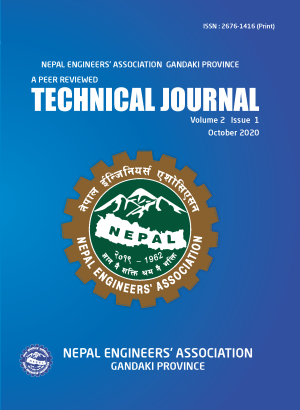Analysis of Slope Stability for Kaande Landslide of Phewa Watershed, Pokhara, Nepal
DOI:
https://doi.org/10.3126/tj.v2i1.32823Keywords:
Draught, hazard, landslide, slope stability, soil bio-engineeringAbstract
Phewa watershed of Kaski, Nepal is constantly facing landslides and soil erosion problems. Andheri Khola sub-basin of Phewa watershed accounts the maximum amount of sediment inflow into Phewa Lake. Therefore Kaande Landslide of Andheri Khola sub-basin, located between Deurali and Paundur villages at the source zone of Andheri Khola is chosen for the slope stabilization to control the sediment flow. The main objective of the study was to analyze the slope stability condition of the landslide area for which the whole landslide area was divided into eight zones starting from the crown to the toe based on the major parameters like soil/rock type, slope inclination, spring source and surface water on the basis of field observation. The factor of safety of each zone was calculated based on stability analysis of an infinite slope of cohesive soils. Sieve analysis result shows the landslide area has coarse grained structure (gravel and sand) dominant. The factor of safety of the landslide was found to be from 0.281 to 0.710. The field assessment and factor of safety reveals the Kaande landslide to be unstable and further possibilities of landslides and soil erosion in the future. For mitigating the hazard, eco-friendly soil bio-engineering measures such as direct seeding of grasses/shrubs, grasses/shrubs/trees plantation, brush layering, and gabion wire bolster cylinders are recommended for slope stabilization based on the optimal techniques guidelines of Mercy Corps Nepal, 2014. It is recommended to apply the proposed mitigation measures as early as possible to prevent the further landslide hazard.
Downloads
Downloads
Published
How to Cite
Issue
Section
License
© Technical Journal
Authors are required to transfer their copyright to the journal.




